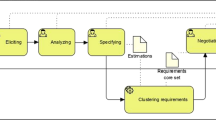Abstract
The clustering stakeholder problem for system requirements selection and prioritization is considered inheritance in the area of requirements engineering. This paper utilized a method for clustering analysis approaches used in the marketing segmentation process for an appropriate number of stakeholders groups. An adapted genetic K-means algorithm for clustering stakeholders for software requirement engineering (GKA-RE) is introduced in this study. The algorithm is capable of generating the optimal number of clusters for stakeholders automatically. Thus, it is providing more quality clustering solution by allowing the initial seeds to be readjusted as needed. The proposed method is experimented on two datasets for system requirements known as RALIC datasets using a number of evaluation metrics and comparing GKA-RE with the K-means approach. The experimental results indicate the superiority of GKA-RE over K-means approach in obtaining higher values of evaluation metrics.
Access this chapter
Tax calculation will be finalised at checkout
Purchases are for personal use only
Similar content being viewed by others
References
Pacheco, C., García, I., Reyes, M.: Requirements elicitation techniques: a systematic literature review based on the maturity of the techniques. IET Softw. 12, 365–378 (2018)
Soo, L.L., Anthony, F.: StakeRare: using social networks and collaborative filtering for large-scale requirements elicitation. IEEE Trans. Softw. Eng. 38, 707–735 (2011)
Ahmed, M.A., Reyad, O., AbdelSatar, Y., Omran, N.F.: Multi-filter score-level fusion for fingerprint verification. In: The International Conference on Advanced Machine Learning Technologies and Applications (AMLTA2018), AISC 723. Springer, Cham (2018)
Alrezaamiri, H., Ebrahimnejad, A., Motameni, H.: Parallel multi-objective artificial bee colony algorithm for software requirement optimization. Requirements Eng. 27, 1–8 (2020)
Wedel, M., Kamakura, W.: Market Segmentation: Conceptual and Methodological Foundations. Springer Science & Business Media, New York (2012)
Sadiq, M.: A fuzzy set-based approach for the prioritization of stakeholders on the basis of the importance of software requirements. IETE J. Res. 63, 616–629 (2017)
Sabri, O., Alfifi, F.: Integrating knowledge life cycle within software development process to produce a quality software product. In: International Conference on Engineering and Technology (ICET), pp. 1–7. IEEE (2017)
Wong, L.R., Mauricio, D.S., Rodriguez, G.D.: A systematic literature review about software requirements elicitation. J. Eng. Sci. Technol. 12, 296–317 (2017)
Anwar, F., Razali, R.: Stakeholders selection model for software requirements elicitation. Am. J. Appl. Sci. 13, 726–738 (2016)
Marghny, M.H., El-Hawary, H.M., Dukhan, W.H.: An effective method of systems requirement optimization based on genetic algorithms. Inf. Sci. Lett. 6(1), 15–28 (2017)
Hujainah, F., Abu-Bakar, R.B., Al-Haimi, B., Abdulgabber, M.A.: Stakeholder quantification and prioritisation research: a systematic literature review. Inf. Softw. Technol. 102, 85–99 (2018)
Li, Y., O’Donnell, J., García-Castro, R., Vega-Sánchez, S.: Identifying stakeholders and key performance indicators for district and building energy performance analysis. Energy Build. 155, 1–15 (2017)
Veerappa, V., Letier, E.: Clustering stakeholders for requirements decision making. In: International Working Conference on Requirements Engineering: Foundation for Software Quality, pp. 202–208. Springer, Heidelberg (2011)
Jain, A.K.: Data clustering: 50 years beyond K-means. Pattern Recogn. Lett. 31, 651–666 (2010)
Krishna, K., Narasimha, M.M.: Genetic K-means algorithm. IEEE Trans. Syst. Man Cybern. Part B Cybern. 29, 433–439 (1999)
Lu, Y., Lu, S., Fotouhi, F., Deng, Y., Brown, S.J.: Incremental genetic K-means algorithm and its application in gene expression data analysis. BMC Bioinformatics 5, 172 (2004)
Rahman, M.A., Islam, M.Z.: A hybrid clustering technique combining a novel genetic algorithm with K-means. Knowl.-Based Syst. 71, 345–365 (2014)
RALIC Dataset. http://www0.cs.ucl.ac.uk/staff/S.Lim/soolinglim/Datasets.html
Iris Data Set. https://archive.ics.uci.edu/ml/datasets/Iris
Gower, J.C.: A comparison of some methods of cluster analysis. Biometrics 23(4), 623–637 (1967)
Veerappa, V.: Clustering methods for requirements selection and optimisation. Doctoral thesis, University College London (2013)
Crawshaw, J., Chambers, J.: A Concise Course in Advanced Level Statistics: With Worked Examples. Nelson Thornes, Cheltenham (2001)
Falkenauer, E.: Genetic Algorithms and Grouping Problems. John Wiley & Sons Inc., New York (1998)
Pizzuti, C., Procopio, N.: A K-means based genetic algorithm for data clustering. In: International Joint Conference SOCO’16-CISIS’16-ICEUTE’16, pp. 211–222. Springer, Cham (2016)
Agustín-Blas, L.E., Salcedo-Sanz, S., Jimnéz-Fernández, S., Carro-Calvo, L., Del Ser, J., Portilla-Figueras, J.A.: A new grouping genetic algorithm for clustering problems. Expert Syst. Appl. 39(10), 9695–9703 (2012)
Xie, X.L., Beni, G.: A validity measure for fuzzy clustering. IEEE Trans. Pattern Anal. Mach. Intell. 8, 841–847 (1991)
Davies, D.L., Bouldin, D.W.: A cluster separation measure. IEEE Trans. Pattern Anal. Mach. Intell. 2, 224–227 (1979)
Rousseeuw, P.J.: Silhouettes: a graphical aid to the interpretation and validation of cluster analysis. J. Comput. Appl. Math. 20, 53–65 (1987)
Hubert, L.J., Levin, J.R.: A general statistical framework for assessing categorical clustering in free recall. Psychol. Bull. 83(6), 1072–1080 (1976)
Dunn, J.C.: Well-separated clusters and optimal fuzzy partitions. J. Cybern. 4(1), 95–104 (1974)
Author information
Authors and Affiliations
Corresponding author
Editor information
Editors and Affiliations
Rights and permissions
Copyright information
© 2021 The Author(s), under exclusive license to Springer Nature Switzerland AG
About this paper
Cite this paper
Reyad, O., Dukhan, W.H., Marghny, M.H., Zanaty, E.A. (2021). Genetic K-Means Adaption Algorithm for Clustering Stakeholders in System Requirements. In: Hassanien, AE., Chang, KC., Mincong, T. (eds) Advanced Machine Learning Technologies and Applications. AMLTA 2021. Advances in Intelligent Systems and Computing, vol 1339. Springer, Cham. https://doi.org/10.1007/978-3-030-69717-4_21
Download citation
DOI: https://doi.org/10.1007/978-3-030-69717-4_21
Published:
Publisher Name: Springer, Cham
Print ISBN: 978-3-030-69716-7
Online ISBN: 978-3-030-69717-4
eBook Packages: Intelligent Technologies and RoboticsIntelligent Technologies and Robotics (R0)




